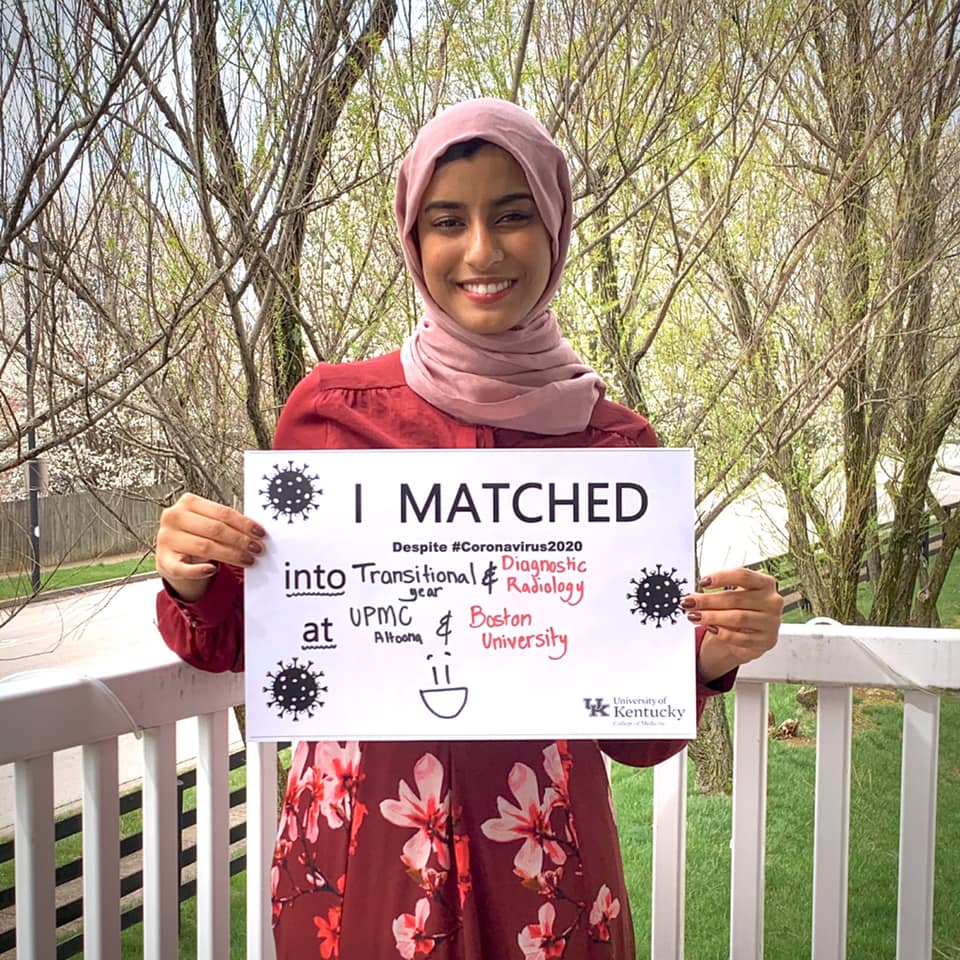Following in Father's Footsteps, Bushra Manzar Explores Rural Medicine
Bushra Manzar was in her first year at the University of Kentucky College of Medicine, standing with some of her peers, when she pulled out her driver’s license, and her friends noticed a stark difference – that her license was vertical, and their licenses were horizontal.
And that’s when they found out that Bushra had an accelerated start to her medical education. Her license was designed differently because she was 18 years old, not in her 20s like many of her fellow M1s.
Bushra grew up in a family of seven children, and they moved quite a bit due to her father pursuing medical training as a cardiologist in rural communities across the United States. Her parents decided that homeschooling would work better for the family rather than changing schools year after year. This allowed Bushra to learn at an accelerated pace, hence why she began medical school in her teens.
“You’d think that age would be a big elephant in the room,” Bushra said, referring to how she fit in with her classmates. “It may have been in the beginning, but after we got to know each other, it wasn’t even a factor.”
Bushra had an early start to her undergraduate education as well. She was 12 years old when she began earning her degree in Biosystems Engineering, the first year at the University of Iowa and then four years at the UK College of Engineering. But to Bushra, “the best machine is the human body,” and she wanted to use those critical thinking skills she developed in engineering to help make communities healthier through a medical education.
Just like her father, Bushra is exploring rural medicine. She enrolled in the UK College of Medicine’s Rural Physician Leadership Program (RPLP), through which students specialize in community medicine. Bushra’s family has been on the frontlines of the country’s rural physician shortage for years. Her father has practiced in various rural communities such as Martin, Ky., and Mountain Top, Pa. At times in his career, he has been the only cardiologist in town, making the impact of his work in treating patients is all the more magnified.
“In a sense, rural medicine was all that I knew growing up,” she said. “It was impactful to witness the appreciation my father received all of these years as a physician practicing in a small town, and I found that pursuing a career in that setting as well would be rewarding.”
As the daughter of a rural physician, especially one who had practiced in Kentucky, Bushra was aware of the need she could help fill. Currently, the state of Kentucky is facing a physician shortage, particularly in rural areas, and therefore, quality health care is not easily accessible to many. The UK College of Medicine has put a focus on educating future health care leaders in Kentucky, for Kentucky. This initiative has included campus expansion in Bowling Green and Northern Kentucky, as well as fostering the growth of RPLP, which has been producing specially trained rural physicians for 10 years now.
Enrolling in RPLP gave Bushra what she calls the “best of both worlds.” She garnered specialized training in rural medicine at UK’s Morehead Campus, along with extensive, hands-on clinical experience at St. Claire HealthCare during third-year rotations. But she also had the opportunity in her fourth year to learn in a large academic medical center at the Lexington Campus. Because of this well-rounded education, she said she feels fully prepared to start her transitional year residency at UPMC Altoona in Pennsylvania, followed by her radiology residency at Boston University in Massachusetts.
Bushra sees it as a privilege to have a head start on her medical career, and she feels well equipped to follow in her father’s footsteps and make an impact for those who need health care the most.
“Medical school has its ups and downs, and every year has new challenges,” she said, “but you don’t know what you’re capable of until you do it.”
